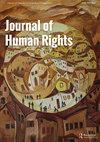Bomberos, maestros y psicólogos: Guatemalan civil society response to the Volcano of Fire disaster
IF 1.6
2区 社会学
Q3 INTERNATIONAL RELATIONS
引用次数: 0
Abstract
Abstract Natural disasters are devastating in many ways; the impact is worse when government response is insufficient. Guatemala’s government has a history of corruption and of contributing to socially constructed vulnerability; government policies have made parts of the population more insecure and vulnerable to disasters. Our study examines individual perceptions of how volunteers, first responders, and members of nongovernmental organizations responded to the deadly eruption of Volcán de Fuego (Volcano of Fire) in Guatemala in 2018, and how this experience influenced their views of the government as well as their own role in civil society. To gain an understanding of civil society reaction, we conducted field research in Guatemala in 2019 and 2020; in addition, we analyzed Facebook posts from a nongovernmental organization formed in the wake of the disaster over the course of two and a half years. Our research suggests that, in the absence of government efficacy, civil society will take a greater role in responding to disasters, despite incurring personal risk by doing so. In addition, it gives voice to the experience of many who witnessed the immediate aftermath of the disaster, adding their insights to the narrative of the tragedy.炸弹侠,大师psicólogos:危地马拉民间社会对火山火灾的反应
自然灾害在许多方面都具有破坏性;当政府反应不足时,影响会更糟。危地马拉政府有腐败的历史,并助长了社会建构的脆弱性;政府的政策使部分人口更不安全,更容易受到灾害的影响。我们的研究考察了志愿者、急救人员和非政府组织成员对2018年危地马拉Volcán de Fuego(火火山)致命喷发的反应,以及这一经历如何影响他们对政府的看法以及他们自己在民间社会中的作用。为了了解民间社会的反应,我们于2019年和2020年在危地马拉进行了实地研究;此外,我们还分析了一个在灾难发生后成立的非政府组织在两年半时间里在Facebook上发布的帖子。我们的研究表明,在缺乏政府效力的情况下,公民社会将在应对灾害方面发挥更大的作用,尽管这样做会招致个人风险。此外,它还讲述了许多目睹灾难发生后的人的经历,为这场悲剧的叙述增添了他们的见解。
本文章由计算机程序翻译,如有差异,请以英文原文为准。
求助全文
约1分钟内获得全文
求助全文

 求助内容:
求助内容: 应助结果提醒方式:
应助结果提醒方式:


